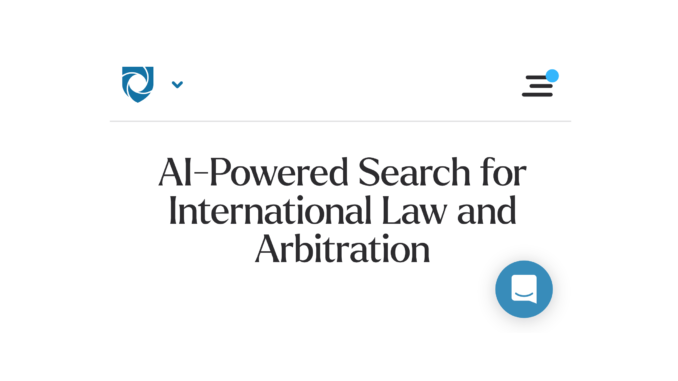
Arbitration-focused platform Jus Mundi has launched what it’s calling Jus AI 2, an AI-powered legal research capability that combines agentic reasoning with deterministic search control. The company kindly explained to Artificial Lawyer how its agent properties work, (see below).
The move builds on an earlier AI product phase, which they’ve called Jus AI 1. The new solution’s ‘AI planning agent creates a multi-step research plan tailored to each query. It then analyses up to 75,000 documents per minute, identifying the most relevant legislations, precedents, and publications from all over the world’.
And ‘it delivers a structured, actionable answer, with transparent reasoning and specific source documents’ they explained.
In summary it offers:
- ‘Agentic AI: Uncover insights others will miss with AI that deconstructs your question, plans its research approach, then executes with precision.
- Fusion Technology: Integration of agentic AI reasoning with deterministic search, to perform deeper research and build stronger arguments.
- Complete Transparency: Every output is fully documented. Detailed and transparent reasoning steps with clear citations, making it easy to verify and trust the insights delivered.’
AL asked the company to please explain how this was ‘agentic’ and they provided some helpful detail:
‘When we say agentic, we mean that Jus AI 2 goes beyond simply prompting an LLM for reasoning. It can:
- Autonomously plan research steps: given a complex legal query, Jus AI 2 breaks it into sub-tasks (e.g. identify relevant treaties, extract arbitrator profiles, check case precedents), figures out which filters to apply on the Jus Mundi database, and executes them.
- Self-correct and reflect: after completing a round of research, Jus AI 2 reviews its own outputs against the question, identifies gaps or inconsistencies, and iterates until it reaches a defensible answer with citations.
- Handle multi-step workflows: depending on complexity, it can run 2–30 research steps without human intervention, applying different filters as needed, pulling from Jus Mundi’s database and user-provided materials. The final output is a structured answer with line-level citations and a transparent trace of how the agent reached its conclusion.
So, to your direct question: at the moment, it is autonomous within a legal research scope, and it is self-correcting through reflection cycles.
It’s not a generic autonomous agent (e.g. sending emails or filing documents), but a specialized legal research agent designed for precision and control. Next, we will build new agents to handle additional arbitration workflows.’
–
Jean-Rémi de Maistre, CEO and Co-Founder of Jus Mundi, concluded: ‘While AI is probabilistic by nature, arbitration professionals need certainty when million-dollar disputes hang on procedural nuances.
‘Jus AI 2 eliminates the compromise between speed and control. For the first time, practitioners can leverage agentic AI reasoning while maintaining complete oversight of their research sources.’
You can find more about Jus Mundi and all it can do here.
—
Legal Innovators Conferences in London and New York – November ’25
If you’d like to stay ahead of the legal AI curve then come along to Legal Innovators New York, Nov 19 + 20 and also, Legal Innovators UK – Nov 4 + 5 + 6, where the brightest minds will be sharing their insights on where we are now and where we are heading.
Legal Innovators UK arrives first, with: Law Firm Day on Nov 4th, then Inhouse Day, on the 5th, and then our new Litigation Day on the 6th.


Both events, as always, are organised by the awesome Cosmonauts team!
Please get in contact with them if you’d like to take part.
Discover more from Artificial Lawyer
Subscribe to get the latest posts sent to your email.